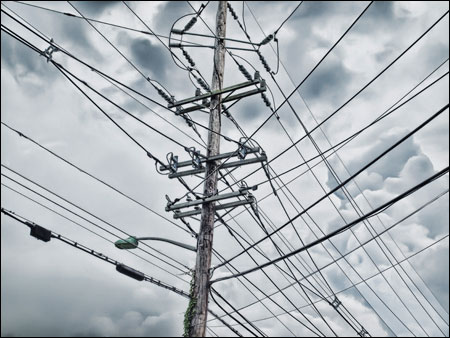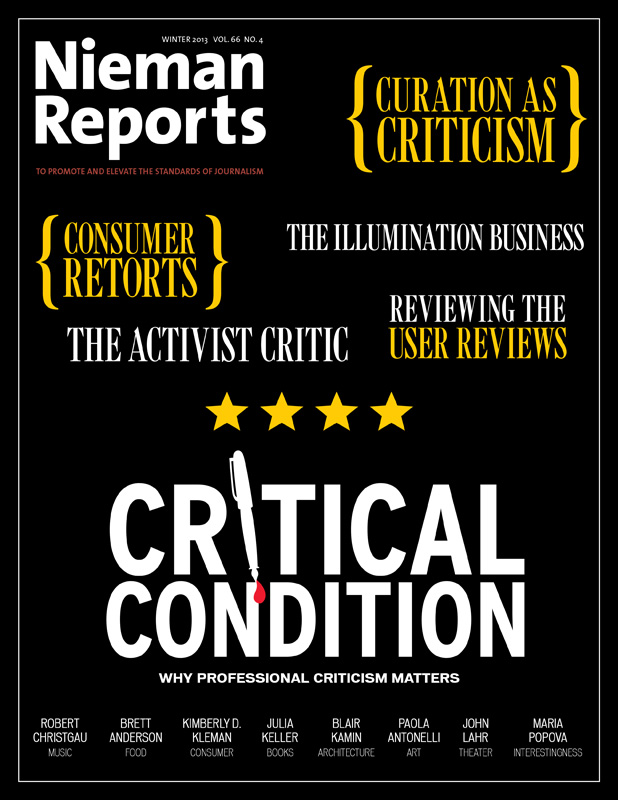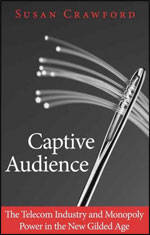
Has the promise of affordable Internet access for all been hijacked? Photo © Ann Thomas/Corbis
Consider two possible American futures. In both, because one cannot imagine it any other way, ubiquitous high-speed connectivity to the Internet is essential in order to fully engage in society, the economy, and the public sphere.
In one possible future—call it utopian—such access is available to everyone; it's fast, and it's not prohibitively expensive. But in the other future—call it dystopian—a handful of giant corporations share almost complete control of wired and wireless access. They don't compete with each other and feel no pressure to provide the kind of high speed, low prices, and universal service available in other countries. Large swaths of American society can't afford or obtain adequate service, making them essentially second-class citizens. As the U.S. stagnates, better-wired economies in Europe and Asia leap ahead.
In "Captive Audience: The Telecom Industry and Monopoly Power in the New Gilded Age," telecommunications policy expert and Cardozo School of Law professor Susan Crawford chronicles and contextualizes the extraordinary rise of industry behemoth Comcast, culminating in its 2011 merger with media and entertainment giant NBC Universal. In telling this story, Crawford compellingly and disturbingly makes clear that we are well on our way to that dystopian future—if not there already—with Comcast boldly leading the charge.
It's hardly unusual for americans to complain about their individual cable experiences—and, more recently, about their wireless data plans. But Crawford's book will be enlightening to consumers who don't fully recognize how collectively crippling these trends are and will be going forward. Crawford, who briefly served in the Obama White House as a special assistant to the president for technology policy, is soundly on the pro-consumer side of the telecommunications debate. But she is no radical. So it is telling that her book, which is at heart a historical chronicle, is also a strong polemic calling for a massive reapplication of governmental power to an industry whose interests have dramatically diverged from the nation's. That's where the facts lead her.
Just a decade ago, of course, the U.S. led the world in Internet access. But between 2002 and 2005, as Crawford explains, the Bush-era Federal Communications Commission (FCC) dramatically deregulated what was then a fast-moving telecommunications industry.
Historically, American companies entrusted with the delivery of public services have been subject to "common carriage" regulation, obliging them, among other things, to serve all comers at fair and affordable prices. Similarly, regulators have traditionally demanded a separation between the ownership of the conduit and the ownership of the content in the communication and transportation industries, to ensure that market forces, not self-dealing, are at work.
That's how it worked with phone service delivered through copper wires. But with the advent of the digital era, the FCC chose not to extend the traditional consumer protection regulations associated with copper to its new competitors, such as cable, fiber and wireless. The idea was that free market competition and innovation, rather than regulation, would create the best options for consumers.
But the actual result was consolidation, not competition, and the creation of the biggest trusts since the Gilded Age. Ten years later, two duopolies—Comcast and Time Warner for high-speed wired access, and Verizon and AT&T for wireless—have exploited high barriers to entry, carved up territories, squelched or absorbed would-be competitors, used their vast market power to intimidate vendors, and generally established a firm chokehold on the nation's communication pipelines, according to Crawford. As she wryly puts it: "Unregulated duopolies do well when they are selling services that Americans cannot live without."
Most notably, neither Comcast nor Time Warner has any incentive to replace its cable wiring with optical fiber. Fiber allows data to flow much more quickly than cable, especially when it comes to users uploading rather than downloading—something that will be increasingly important as people rely on cloud-based data centers.
Instead of plowing their enormous profits into new infrastructure that would benefit the whole nation, cable company executives pump all that cash into dividends and stock buybacks, enriching themselves and their biggest stockholders while keeping Wall Street analysts happy, Crawford argues.
Part of Crawford's tale is about how legislators and regulators—catering to big money and powerful lobbyists—have aided and abetted this downward slide. "Instead of ensuring that everyone in America can compete in a global economy … U.S. politicians have chosen to keep Comcast and its fellow giants happy," she writes. And that includes Barack Obama, who she says has not lived up to his promises to make "world-leading, reasonably priced, wired open Internet access for everyone" a priority. In Crawford's view, Obama FCC chief Julius Genachowski is as timid as his predecessors when it came to confronting the powerful telecom interests,
Crawford also despairs at how consistently the press has missed the big story in favor of smaller ones about new deals and shiny objects. She is particularly critical of the paltry coverage of the Comcast/NBC Universal merger, the immensity and destructiveness of which is her book's main argument.
Crawford also dispels the common misperception that wireless is an adequate substitute for wired service. Wireless provides dramatically lower speed for dramatically higher prices. The kinds of high-bandwidth activities that are rapidly becoming essential at home or in the office are simply impossible, whether it's streaming video, running a small business, or taking advantage of cloud computing. The reality, Crawford writes, is that "a racial and economic digital divide is emerging in America: Hispanics, rural Americans, African Americans, and low-income Internet users disproportionately rely on wireless connections for access to the Internet."
In the book's final chapter, Crawford lays out an alternate course—a more utopian one. She describes how Lafayette, Louisiana and Chattanooga, Tennessee laid down their own municipal fiber networks, providing residents with faster, cheaper and more reliable service that will pay for itself in two to three years. Google is famously wiring the Kansas City area with fiber, in an attempt to encourage the telecom giants to do the same in other locales.
Crawford also calls for the government to force the giants to share the "last mile" of wire that connects to homes and businesses, letting other companies purchase access at reasonable wholesale prices. That would reintroduce competition.
And then there's the brute-force option: Crawford estimates it would cost the federal government about $90 billion to bring fiber to the homes of all Americans. That's a lot of money, of course, but not so much when you compare it to the estimated $800 billion to $3 trillion price tag of the war in Iraq. In fact, Crawford writes: "For the same amount that the country spends on defense research in one year, America could bring access to fiber networking to all Americans for generations … Eighty percent of the cost would be labor—which is good for job growth."
What's needed—and what's been missing—is leadership. "American leaders need to insist on the nation's shared interests. They need to have conviction and authority as well as a coherent set of principles and policies," Crawford writes.
The language of telecommunications policy is notoriously arcane, and although Crawford does an admirable job of untangling it, the book can be a tough read at times. But the introduction alone is a tour de force, and the ending is as good a call to arms as you'll find.
Dan Froomkin, who has been a Washington correspondent for The Huffington Post, writes about watchdog reporting for Nieman Reports.




